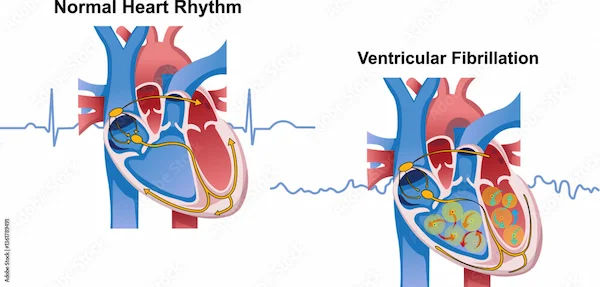Preventing Heart Disease: A Heart-Healthy Lifestyle
Learn how to prevent heart disease with a heart-healthy lifestyle. Discover essential tips on diet, exercise, stress management, and other habits to keep your heart strong and healthy.

Written by Dr Sonia Bhatt
Last updated on 3rd Jul, 2025
Heart disease remains a leading cause of death globally, but the empowering truth is that many heart disease cases are preventable through lifestyle modifications. Adopting a lifestyle focused on preventing heart disease can significantly reduce your risk and promote overall cardiovascular health. This article provides comprehensive, actionable advice to help you lead a heart-healthy life. You can significantly reduce your risk of developing heart disease by making simple, sustainable changes to your daily lives.
Understanding Heart Disease
Heart disease refers to a range of conditions that affect the heart, including coronary artery disease (the most common), heart attacks, heart failure, and arrhythmias (irregular heartbeats). These conditions can develop over time, often without noticeable symptoms until they become serious. The primary risk factors include high blood pressure, high cholesterol, smoking, diabetes, obesity, and a sedentary lifestyle. However, many of these risk factors are controllable by simple lifestyle changes. By making healthier choices, we can prevent heart disease and live longer, healthier lives.
The Role of Lifestyle in Heart Disease Prevention
Our lifestyle choices play a major role in preventing heart disease. By adopting healthier habits, you can significantly improve your heart health. Let’s explore the key important aspects of a heart-healthy lifestyle.
1. Eating a Heart-Healthy Diet
What you eat has a direct effect on your heart. A healthy diet can help lower cholesterol, regulate blood pressure, and prevent heart disease. Here’s how you can make heart-friendly food choices:
Focus on Whole, Nutrient-Rich Foods: Focus on variety of fruits and vegetables, which are packed with fiber, antioxidants, and essential nutrients. Choose whole grains like oats, quinoa, and brown rice to regulate cholesterol levels and improve digestion. Opt for lean proteins like chicken, fish, beans, and legumes.
Choose Healthy Fats: Not all fats are bad for your heart. Incorporate monounsaturated and polyunsaturated fats from olive oil, avocados, nuts, and fatty fish (like salmon). These fats can help reduce harmful cholesterol levels. Avoid saturated fats (found in red meat and full-fat dairy) and eliminate trans fats (found in many processed and fried foods), which can raise cholesterol and increase heart disease risk.
Limit Sodium and Sugar: Too much sodium can raise blood pressure, so try to limit your intake to under 2,300 mg per day (or, ideally, 1,500 mg if you have high blood pressure). Reduce your consumption of added sugars, which can contribute to obesity, diabetes, and heart disease. Opt for natural sugars from fruits instead of sugary snacks and drinks.
Control Portion Sizes: Eating large portions, even of healthy foods, can lead to weight gain. Be mindful of portion sizes to maintain a healthy weight, which directly impacts your heart health.
2. Staying Active
Regular physical activity is one of the most powerful ways to lower your risk of heart disease. Exercise helps manage weight, control blood pressure, lower cholesterol, and improve circulation. Here’s how to stay active for heart health:
Aerobic Exercise: Aim for at least 150 minutes of moderate-intensity exercise each week. Activities like walking, cycling, and swimming strengthen your heart and improve blood circulation. These exercises also help reduce stress and improve overall energy levels.
Strength Training: Include muscle-strengthening exercises at least twice a week. These exercises, such as weightlifting or bodyweight movements, help maintain muscle mass, boost metabolism, and support heart health.
Flexibility and Balance: Incorporating yoga or tai chi into your routine can improve flexibility, balance, and relaxation. These practices also help reduce stress, which is a major factor in heart disease.
Start Small, Stay Consistent: If you're new to exercise, start with manageable activities, like a short walk after meals or a 10-minute yoga session. As your endurance improves, gradually increase the intensity and duration of your workouts. Consistency is key to seeing long-term benefits.
3. Managing Stress
Chronic stress is a major contributor to heart disease. It can raise blood pressure, increase inflammation, and lead to poor lifestyle choices like overeating and smoking. Managing stress is essential for maintaining heart health. Here’s how you can keep stress in check:
Practice Relaxation Techniques: Deep breathing, meditation, and mindfulness techniques can help lower stress and promote relaxation. These techniques can reduce blood pressure and improve overall well-being.
Stay Active: Exercise is one of the best ways to relieve stress. Whether a walk in the park or a calming yoga session, physical activity releases endorphins, improving mood and reducing stress.
Prioritise Sleep: Lack of sleep can exacerbate stress. Aim for 7-9 hours of restful sleep each night. Good sleep helps your body and mind to recover from illness and is essential for stress management.
Connect with Loved Ones: Spending quality time with loved ones or joining a support group can help buffer the effects of stress. Social connections provide emotional support and improve overall mental health.
Set Realistic Goals: Stress often arises from overwhelming tasks. Break large goals into smaller, manageable steps, and give yourself breaks to recharge. This approach helps prevent burnout.
4. Maintaining a Healthy Weight
Carrying excess weight, especially around your abdomen, is a major risk factor for heart disease. It can lead to high blood pressure, high cholesterol, and type 2 diabetes—all of which increase your risk of cardiovascular problems. Here’s how to achieve and maintain a healthy weight:
Healthy Eating: Focus on nutrient-dense foods that provide energy without excess calories. Avoid processed foods and sugary drinks, which can contribute to weight gain.
Regular Exercise: Physical activity is key to weight management. It helps burn calories, build muscle, and improve metabolism.
Tracking Progress: Monitor your weight and progress over time. Remember, the goal is long-term consistency, not rapid weight loss.
5. Quitting Smoking
Smoking is one of the most significant risk factors for heart disease. The chemicals in cigarette smoke damage blood vessels, raise blood pressure and increase the risk of strokes. The good news is that quitting smoking can dramatically reduce your risk of heart disease.
The Benefits of Quitting:
Within 20 minutes: Your heart rate and blood pressure can drop to normal levels.
Within 12 hours: The carbon monoxide level in your blood can return to normal.
Within 1 year: Your heart disease risk can be reduced significantly compared to a regular smoker.
6. Limiting Alcohol Intake
Moderate alcohol consumption may have some heart benefits, but excessive drinking can lead to high blood pressure, heart failure, and an increased risk of stroke. The key is moderation.
Alcohol Guidelines: Women should limit alcohol to one drink per day, and men should limit alcohol to two drinks per day. One drink is equivalent to 12 ounces of beer, 5 ounces of wine, or 1.5 ounces of distilled spirits.
Non-Alcoholic Alternatives: Opt for flavoured water, herbal teas, or mocktails in social situations to reduce alcohol consumption.
7. Regular Health Screenings
Regular check-ups and health screenings help catch heart problems early, even before symptoms arise. Common screenings include:
Blood Pressure Monitoring: High blood pressure is a major risk factor for heart disease. Keep track of your blood pressure and take steps to manage it through lifestyle changes and medication if needed.
Cholesterol Levels: High cholesterol can lead to plaque buildup in the arteries. Have your cholesterol checked regularly and follow your doctor’s recommendations.
Diabetes Screening: Diabetes increases the risk of heart disease. Regular blood sugar checks are essential to prevent complications.
Speak to your doctor about scheduling these screenings and discuss any family history of heart disease that may warrant more frequent monitoring.
Conclusion
Lifestyle plays a crucial role in preventing heart disease and is essential for maintaining heart health. By adopting heart-healthy eating patterns, engaging in regular physical activity, quitting smoking, managing stress, moderating alcohol consumption, and keeping up with routine health screenings, you can significantly reduce your risk of heart disease and improve your overall quality of life.
Remember, it's never too late to start making positive changes. Small, consistent steps can lead to significant improvements in heart health. Empower yourself with the knowledge and commitment to lead a heart-healthy lifestyle for a longer, healthier life.
Consult Top Cardiologists
Consult Top Cardiologists

Dr. Anand Ravi
General Physician
2 Years • MBBS
Bengaluru
PRESTIGE SHANTHINIKETAN - SOCIETY CLINIC, Bengaluru

Dr. Tripti Deb
Cardiologist
40 Years • MBBS, MD, DM, FACC, FESC
Hyderabad
Apollo Hospitals Jubilee Hills, Hyderabad
Dr Moytree Baruah
Cardiologist
10 Years • MBBS, PGDCC
Guwahati
Apollo Clinic Guwahati, Assam, Guwahati

Dr. Zulkarnain
General Physician
2 Years • MBBS, PGDM, FFM
Bengaluru
PRESTIGE SHANTHINIKETAN - SOCIETY CLINIC, Bengaluru

Dr. Janjirala Seshivardhan
Cardiologist
7 Years • MBBS,DNB(GM),DM(Cardiology)
Manikonda Jagir
Apollo Clinic, Manikonda, Manikonda Jagir

